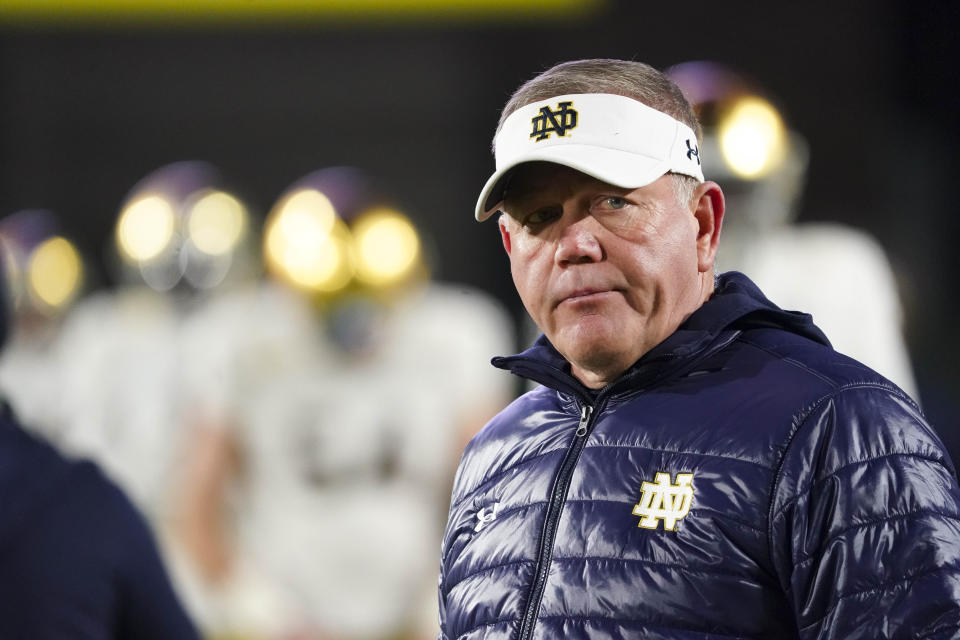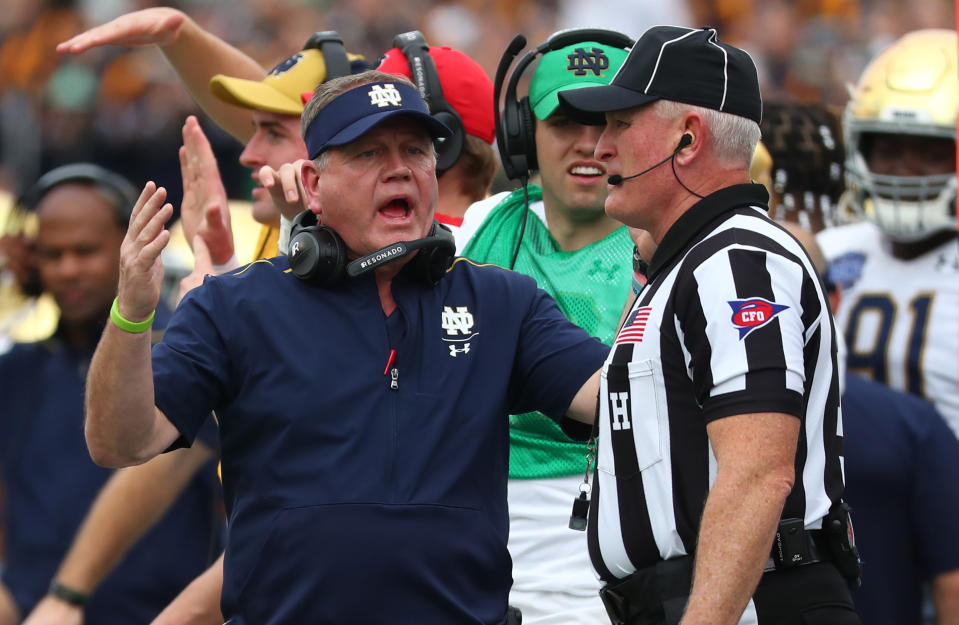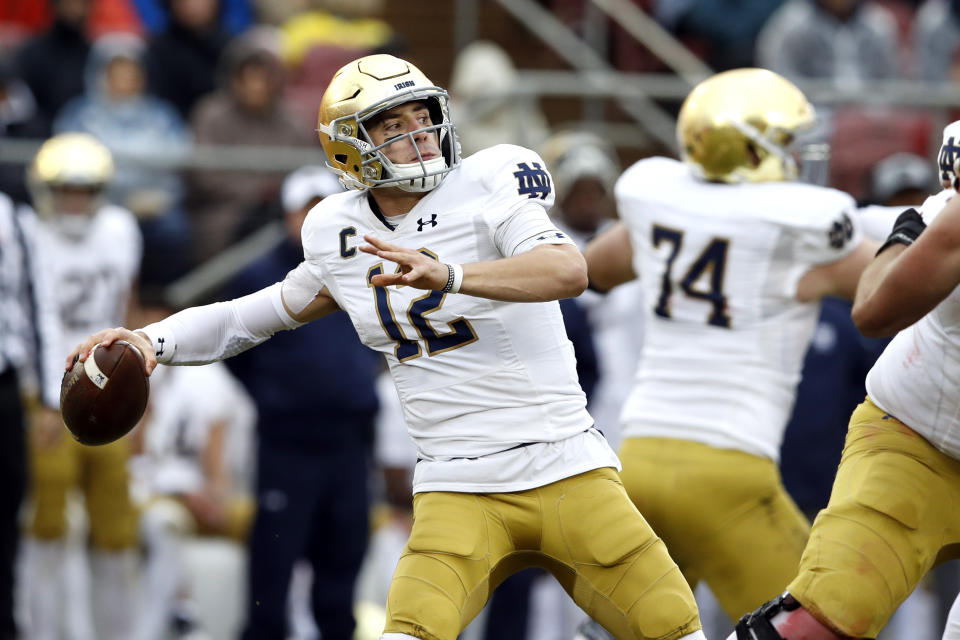Brian Kelly’s final goal at Notre Dame: 'Win a national championship'

SOUTH BEND, Ind. — Brian Kelly is heading into his 11th season at a time of unbridled optimism for Notre Dame. The Fighting Irish are winning big, recruiting is on an uptick and Kelly is grateful for the administrative cohesion that’s led to the modernization of the program. He sat down with Yahoo Sports for a lengthy interview in his office in late February. Here are the top 10 takeaways on an expanse of topics — the 2020 Irish team, his contract, the changing face of ND recruiting and his quest to win a national championship.
How much longer will Brian Kelly coach?
Kelly, 58, maintains that he wants to finish his career at Notre Dame. And he’s pouring his energy and vision into winning a national title during that final kick. Kelly wouldn’t specify the number of seasons he could have left, but it’s realistic to see him coaching about a half-dozen more years. He’s worked hard with the Notre Dame administration to get the Fighting Irish to the point where they reached the national title game in 2012, earned a spot in the College Football Playoff in 2018 and finished in the top 15 the last three seasons. He’s eager for the final step. “We’ve gotten this program back in the game,” Kelly said. “But we’re just in the game; we’re not winning it. We got invited back up to the table. We want to do more.”
What’s Kelly’s contract status?
That’s a natural segue to Kelly’s contract, which has just two years remaining. Kelly said that the general terms of his contract extension have been completed. “I don’t want to go anywhere else,” he said. The holdup to announce it is tied to the logistics surrounding facilities projects that will be tied to the deal. “It doesn’t really have anything to do with money anymore,” Kelly said. “This is really about, where do you want your program to be, and where do you want it to be moving forward? A lot of this is about where this program needs to grow.”
Building a future at Notre Dame
What does that mean in real time? Notre Dame is fresh off completing one of the more impressive facilities projects in the sport, a stunning new brick indoor facility that opened in 2019. “There can’t be more than a handful in the country that are better,” Kelly said. “It’s spectacular.”
Kelly is grateful for all the hard work, donations and administrative muscle that it took to finish the building. He’s got one more project in mind. Kelly wants the Guglielmino Athletics Complex, which opened in 2005, to “push out” to include more room for things like food service, academics and sports science to better accommodate his players. “This building wasn’t built to house all those things,” he said of the Guglielmino Athletics Complex, which houses the offices and locker room. “When they built it, it wasn’t built for one-stop shopping. That’s contractually where we’re trying to get some things nailed down. I think we’ll get that done here pretty soon.”
With any kind of facilities project comes certain complications — architects, fundraising, building schedules and the general red tape that slows large projects at any university. Kelly knows, understands and appreciates all this, having spent a decade stooped in Notre Dame process. When a reporter joked with Kelly about Notre Dame being notoriously slow compared to some SEC brethren, he flashed a bit of his Boston sarcasm: “It doesn’t happen overnight,” he said with a grin. “They draw it up on parchment paper with a wax seal, it’s pretty cool.”
When will Kelly sign a new deal?
What could be the timing of Kelly’s new deal? He sounded confident it would be completed before kickoff in 2020. “Oh, yeah,” he said “No doubt.” The motive of tying facilities improvements to his deal is a simple one — keeping the momentum the Fighting Irish have built during his first decade to allow Notre Dame to take the final leap from championship contender to champion. “I think we’re going to be addressing all of these things contractually to make certain that all the work we did to get to this point wasn’t just so we could get in the [championship] game. Let’s continue to move this in the direction, and get it to the point where we win a national championship. [It has been] a lot of hard work to get here.”

Consistency is key
The state of the union in South Bend is as serene as it’s been since Lou Holtz’s heyday. Kelly has led Notre Dame to three consecutive 10-win seasons for the first time since the early 1990s. He’s won 71.3 percent of his games (92-37), a precipitous uptick from Notre Dame winning just 57.4 percent (70-52) the prior decade. Kelly has methodically modernized Notre Dame to where inhabiting the top 10, a place Notre Dame should start next season, has gone from a goal to an expectation. (Kelly’s total doesn’t factor in the 21 victories redacted by the NCAA for impermissible academic help.)
Kelly ranks No. 4 on Notre Dame’s all-time wins list, and will likely pass Ara Parseghian (95) and probably Holtz (100) this season to vault to No. 2 on the career wins list. He could technically catch Knute Rockne (105) for the top spot this season, but that would require sweeping the regular season and winning one postseason game. When Kelly reflects on his biggest accomplishments, it’s an appreciation of how the campus has worked together to push Notre Dame forward.
“It’s consistency and losing the narrative of relevancy,” Kelly said when asked what he’s proud of, a decade into his tenure. “We’re gonna be there, teams want to play Notre Dame. We went to Louisville and Georgia this year and set an attendance record. Wherever we go, we continue to do that in 2019. You only do that by putting a successful product on the field.”
Closing the gap on nation’s top teams
To close the distance between teams like Alabama, Clemson and LSU, Kelly knows that a lot will come down to recruiting. Notre Dame finished No. 23 nationally in Rivals.com’s rankings last season (3.59). The Irish find themselves No. 4 in the overall rankings for 2021. The Irish’s eight commitments include quarterback Tyler Buchner from La Jolla, California, who has offers from the programs Notre Dame needs to consistently beat in recruiting to win a title — Alabama, Georgia and Oregon.
Early in his career at Notre Dame, Kelly acknowledges that he apologized for the school instead of embracing the restrictions in recruiting. These days, he’s raving about how residential life and admissions have helped the Notre Dame recruiting staff adjust to the early singing day.
In Kelly’s 10 seasons, the recruiting staff has expanded from two full-time employees to six, along with three part-timers and a cadre of students. (He jokes that there are 14 seats in the recruiting office, which are always full.) Half the staff focuses on football fit, while the other half focuses on cultural fit. (He points out Notre Dame has averaged 10 early enrollees, which is a testament to the bridge program that’s helped smooth the transition, and more families of recruits have been attracted to on-campus classes as opposed to the online trend at many schools.)
That has left Kelly optimistic about Notre Dame’s upcoming classes. He said Notre Dame is unlikely to land a No. 1 recruiting class because of “the guardrails that are always going to be in place,” in reference to the academic standards. But he remains optimistic that improvement is coming. “We can move out of the No. 12-15 spot in recruiting,” Kelly said, “and we can move up into that top five, elite status.”
How new transfer rules impact Notre Dame
Kelly is optimistic that the new transfer rules being discussed will be helpful to a program like Notre Dame. He’s looking for “some kind of guidance” in terms of academic guidelines from the NCAA, but feels that the potential change will help Notre Dame. He made an interesting point about how the rule will continue to nudge college football toward the NFL, with personnel departments spying other programs. “You got the Buffalo Bills and the Saints, and they’re looking at [each other’s] roster,” he said.
The rule will help those positioned at the top of the college football food chain. “I think if you have a good culture and a degree that will stand up to the test of time, you’re not going to lose a lot of guys,” Kelly said. “So we sit here at Notre Dame feeling it’s going to work fine for us.”

What to expect offensively next season
Kelly is optimistic about what the Irish will look like on the field in 2020. Ian Book, the returning quarterback with a 20-3 record, finished last season with 19 touchdowns and four interceptions in the final six games. That run came in the immediate aftermath of an 8-for-25 clunker in Notre Dame’s 45-14 blowout loss to Michigan. Kelly said Book’s ability to channel what he’s learned about the pressure, expectations and scrutiny of being the Irish quarterback will be the key to him starring in 2020. “If he’s able to do that and build off his last six weeks, he’ll be one of the best quarterbacks in the country,” Kelly said.
With five experienced offensive linemen returning — including four who rank in Pro Football Focus’ Top 30 in the country — Kelly sees an identity forming of a physical team that could explore more multi-tight end packages. (He does predict a “breakout” season for redshirt sophomore receiver Kevin Austin, who missed last season.)
Kelly is seeking more explosion from the tailback position. In recent seasons, Notre Dame has lacked a back who can burst through a seam and run away from a defense the way C.J. Prosise and Josh Adams did. Could the answer be four-star Chris Tyree? He’s the blue-chip recruit brought in by newly promoted run-game coordinator Lance Taylor and will enroll this summer. Said Kelly: “He’s a guy that’s going to open up the offense for us.”
What to expect defensively next season
On defense, there are fewer returning starters but a general confidence in the scheme after Notre Dame finished No. 12 nationally in scoring defense last year. Notre Dame has to replace a pair of NFL defensive ends, Julian Okwara and Khalid Kareem, but has strong depth at every position except cornerback. Safety Kyle Hamilton is a future star, and Kelly generally expects the Irish to again lean on a defense that has kept its groove under third-year coordinator Clark Lea. “If you play the caliber of defense we played last year, you’ve seen it,” he said. “You can muck it around on offense.”
Kelly is confident in Lea, who he calls “awesome” and is appreciative of Lea’s inclusive nature with his role on the defense. The promotion of former quarterback Tommy Rees, 27, to offensive coordinator has been the spring’s biggest storyline. Kelly has called the move “gratifying” and complimented Rees’ self-awareness toward staff dynamics and player relationships.
“I thought I was going to be inundated with, ‘Hey can I change this formation to this? Do you mind if I call inside zone this?’ ” he said. “I haven't gotten any of that sophomore nonsense stuff. It’s been much meatier, the stuff that goes to success. You know I call that other stuff, it is like winning stuff. This is successful stuff.”
How Kelly’s job has changed
In the wake of Notre Dame’s 4-8 season in 2016, Kelly divorced himself from the day-to-day workings of the offense and stepped back to approach the job from a more holistic perspective. Notre Dame has gone 33-6 since, winning nearly 85 percent of its games.
Kelly has adjusted well, as he said there are 51 football-related employees he helps manage, along with the 100 or so players. Kelly has settled into a role that remains hands-on and still bristles at the term CEO, which he said sounds too aloof.
Kelly describes his day-to-day duties as handling myriad tasks. That includes a lot of hiring, as Notre Dame just made official that Mike Mickens, a former star corner for Kelly at Cincinnati, will be the defensive backs coach. Kelly loved that the first slide in his interview presentation was “block destruction.” (“It wasn’t a backpedal, it wasn’t breaking up on the ball, it was block destruction,” Kelly said with a laugh. “Hire this guy!”)
On a normal offseason day, he’ll watch 6:15 a.m. workouts and spend time with the players. From there, he’ll do everything from helping guide logistics for a walkthrough for Notre Dame’s opener against Navy in Ireland to planning a June speaker series, chatting with the nutritionist about a player’s weight gain/loss and watching film on recruits so they can get a formal offer letter.
In reality, Kelly isn’t hands-off as much as he has his hands in more places around the program.
“At first, I wasn't comfortable with the role,” he said. “Now, I enjoy it. When I first thought about this, I’m like, ‘Man, I don’t want to do this. I’m gonna miss that, I’m gonna miss that.’ But in the reality, I’m doing it all anyway. I’m just doing it in different times and in different segments.”
More from Yahoo Sports:

